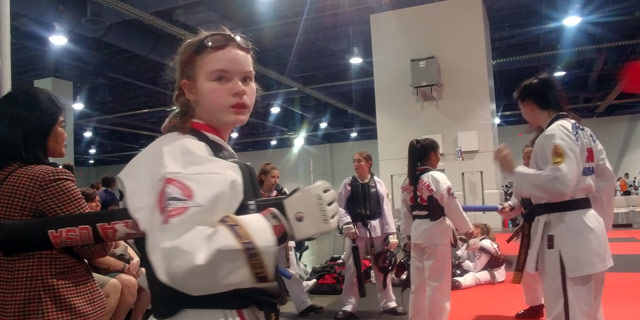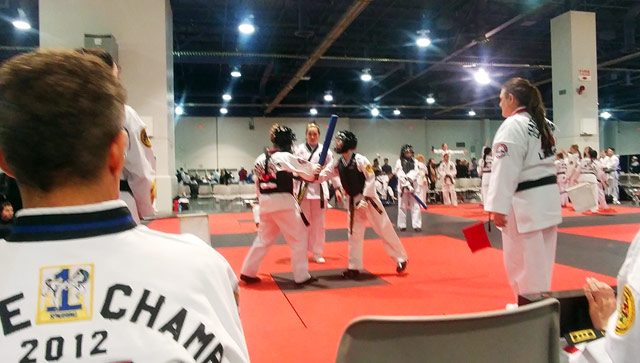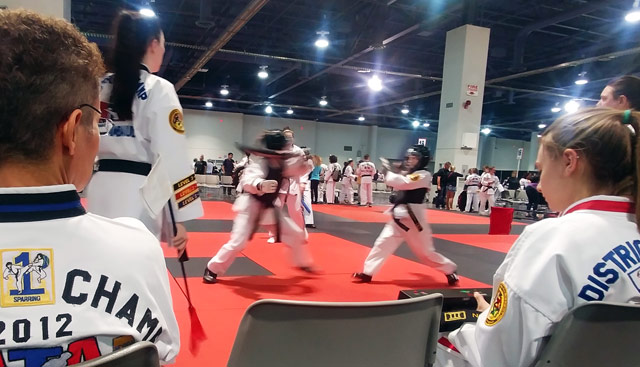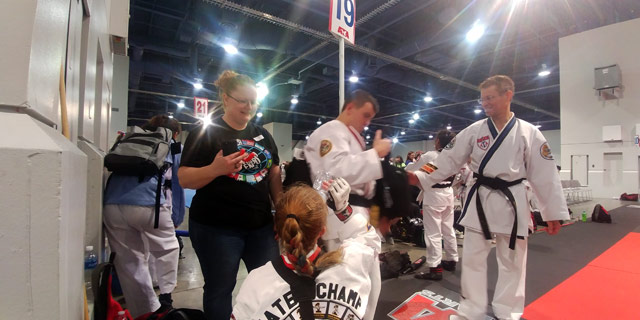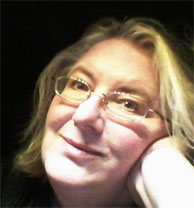Back in June this year, just after our triple digit temperatures had arrived in Las Vegas, friends from LA visiting in town treated me to lunch at Gordon Ramsay’s Hell’s Kitchen restaurant. Two years previously, they had treated me to lunch at Ramsay’s Pub and Grill. They knew I’m a big fan of Ramsay’s TV programs. The first experience at the Pub and Grill introduced me to the Chef’s legendary Beef Wellington, and it proved to be everything legend said it was. So, the prospect of dining at Hell’s Kitchen definitely excited me.
Alas, I am not enough of a foodie to remember to take photos of the dishes. Instead, I was focused on absorbing the sensory experiences as they happened.
Since I had already had the Beef Wellington, I wanted to try other things on the menu. So, ahead of my lunch I spent time studying the menu online, thinking about what I wanted as a lunch meal.
Now, please understand I had a really lovely visit with my friends. Although we communicate on Facebook fairly regularly, it had been two years since we had been face-to-face. So, it was great to catch up on things in our lives, they having more events to describe than I with my small, quiet existence. But I want to wax rhapsodic about food.
For my first course, I chose the Carrot Soup. The menu said the soup is served with Greek yogurt, a pinenut granola, and vadouvan. Now, vadouvan is a spice mix sometimes called “French curry.” It’s a blend of spices that is a derivative of masala. Although the mixture can vary, it should at least contain garlic, pounded onion, mustard and cumin seeds, and the herb fenugreek. Since really hot spices don’t go through my system comfortably, it was fortunate this mix was – according to the Matre d’ – on the mild side. He was right.
The soup was actually served at the table. The bowl was set before me with the dollop of yogurt artistically placed in the center of the otherwise empty bowl, more piped like frosting than dropped from a spoon. The pinenut granola was sprinkled on it, with the sprig of the herb crowning it. Then the soup itself was poured into the bowl from a small pitcher, carefully circling the yogurt. It was actually beautiful, a consistent color of a thick, creamy smooth soup. The soup by itself would have been very satisfying, with just a touch of sweetness to it. But blending in the yogurt and granola added excitement to it. The spices gave a distinctive flavor, but not so much that they took over the show. And the pinenut granola added a tasty little bit of crunch. Over all, it was so good, I fell in love with it and would have been happy to eat it all day. I even thought vaguely of asking for a second serving, but restrained myself, since I was also looking forward to the Salmon.
The menu indicated the famed Crispy Skin Salmon is served with spätzle, mushrooms, and a citrus beurre blanc. I had never heard of spätzle, so I had looked it up beforehand. It’s a Central European noodle, given a small roundish form. I was very curious about it. When the plate arrived in front of me, the salmon sat on top the spätzle and mushrooms and it all looked inviting. I’m not usually one to rave about mushrooms, but these were prepared in a tasty sauce and well suited to the spätzle.
The prize, of course, was the salmon. The skin on the top was indeed crispy and the citrus beurre blanc was just the perfect touch: there was not so much of it that it drenched the fish, and instead it burst on the tongue with a quick spike and then gave way to the perfectly cooked salmon. I’d once had salmon at a far more ordinary restaurant that had been so over-cooked that it tased like paper. The Hell’s Kitchen salmon belonged in a totally different world. Moist and tasty. The whole dish was satisfying dream. The portion was perfect, enough to feel like a proper meal, but not so much that I felt stuffed and incapable of facing the dessert. Instead, I looked forward to the last course.
For dessert I had chosen Coconut Three Ways. I was very curious about this one, since I love coconut. The dish is described as a coconut sorbet, with a passionfruit caramel sauce, served with coconut croutons in a fresh half coconut. It came to the table with the coconut shell set in a bowl filled with ice – dry ice, as it turned out. The waiter placed it before me and then poured some water on the dry ice for the dramatic fog reaction, rising up and over the table. This would continue as I ate the dessert since the melting ice would produce more water. I suspect the waiter may have poured too much water into the ice, because the melt water rose up over the brim of the bowl and spilled over the table. Well, actually flooded. We used several serviettes to mop it up Not what you expect in a high-end restaurant, but still somehow fun.
Anyway, back to the food.
The coconut sorbet was very delicately flavored, not so heavily sugared that it would taste like a candy bar. The passionfruit caramel sauce suited it well. The passionfruit has a distinct but pleasing taste. It combined well with the familiar coconut. The coconut croutons were delightful and crunchy. I would love to sit down with a package of those croutons. I don’t know about other people, but I love fresh, raw coconut. After scraping some from the shell, I decided it was coming home with me and requested a box (I ate it sliver by sliver over the next two nights).
All in all, the meal was an ideal delight. Watching so many Gordon Ramsay programs, I have, of course, become aware of his obsession with perfectly balancing the flavors in a dish. Finally getting the opportunity to eat food prepared to his standards was a revelatory experience. It changed what I expect from a dish, of flavors, of seasoning. I know I have eaten at some excellent restaurants before, but the combination of learning from Ramsay in what he says about cooking in all his programs and in actually tasting what that mind produces has made me appreciate what can be done with food.
If you ever get the chance to dine at a Gordon Ramsay restaurant, take it. Hopefully, it will delight you as it has me.

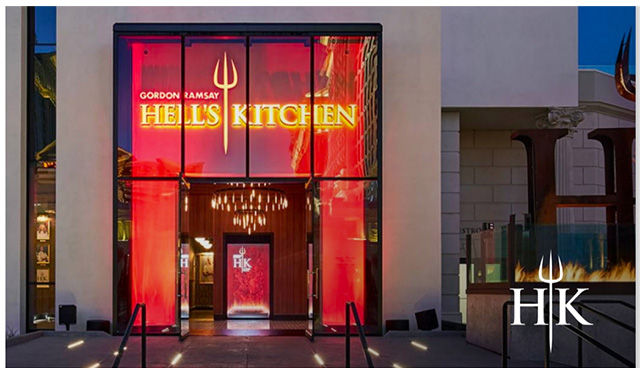




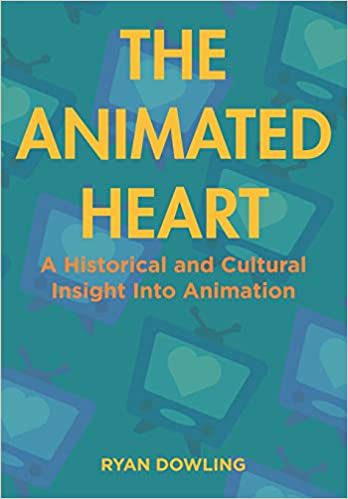
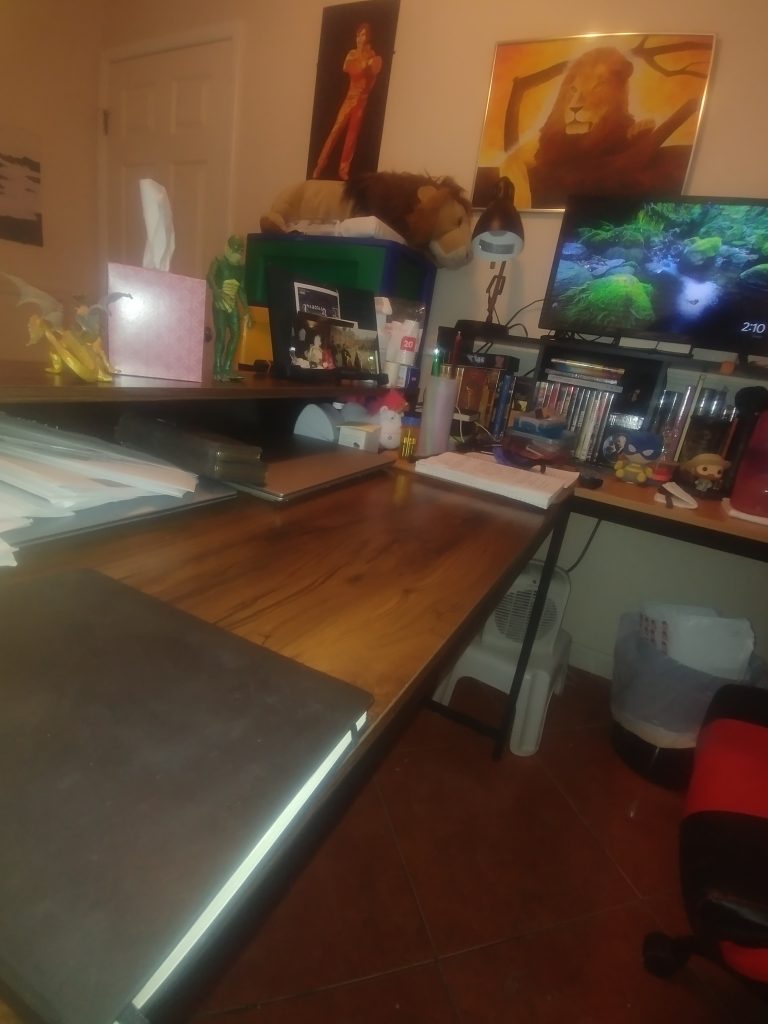
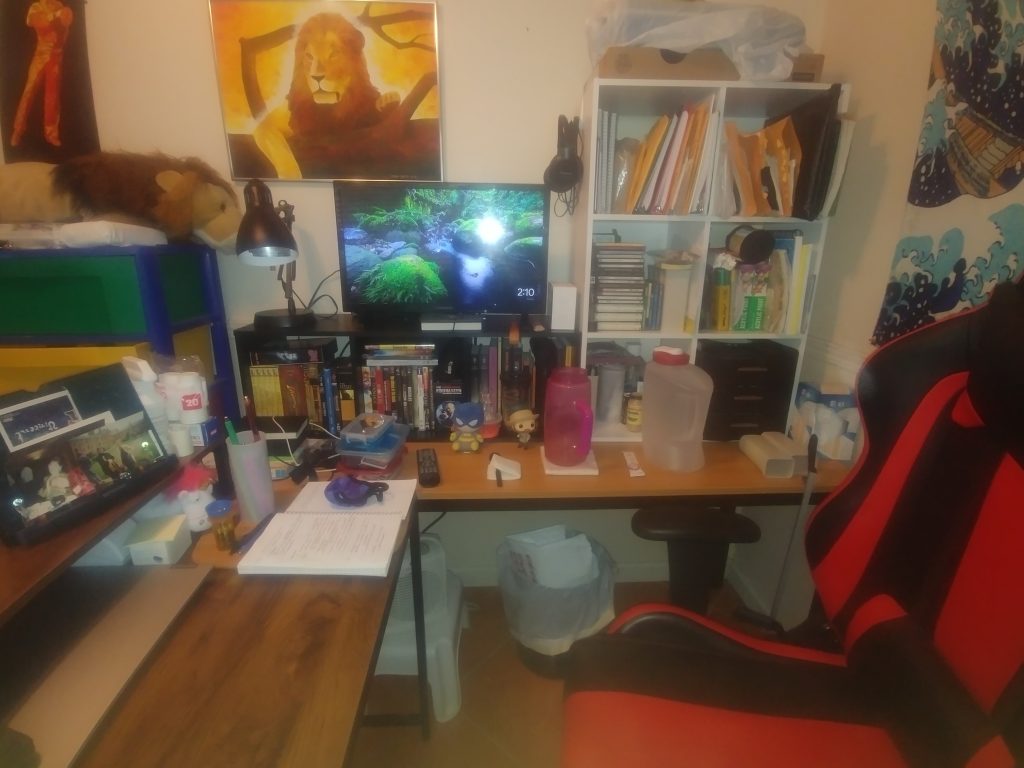
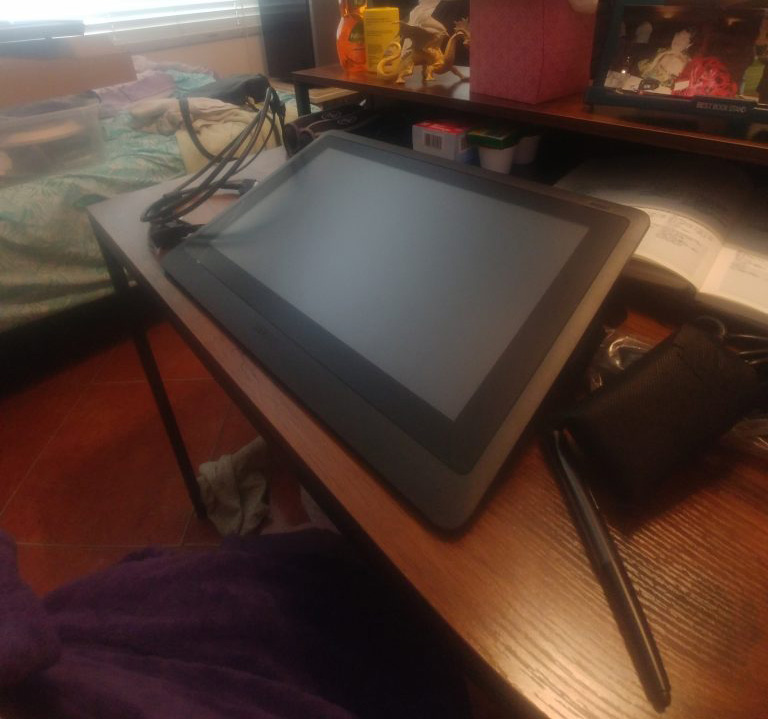
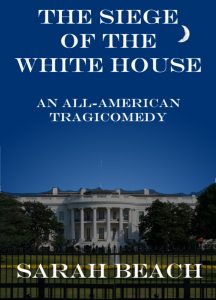
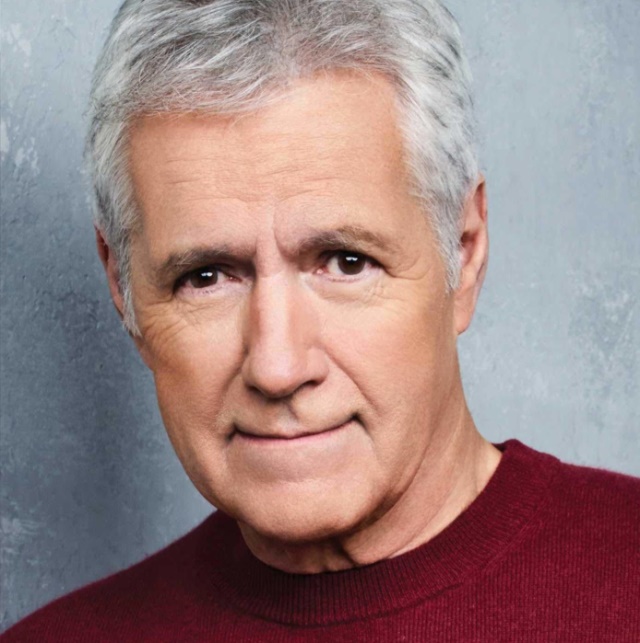
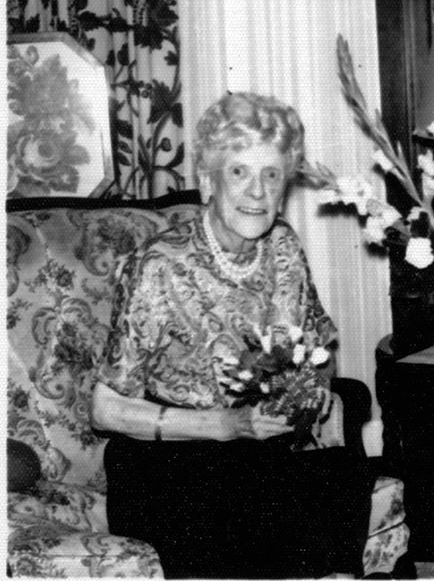
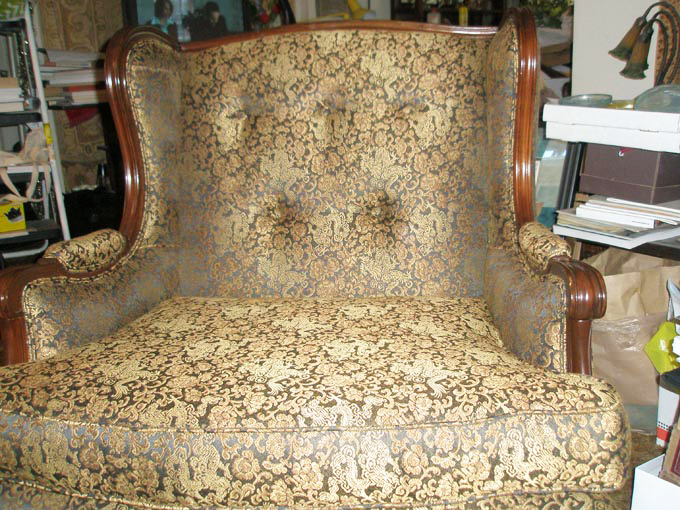
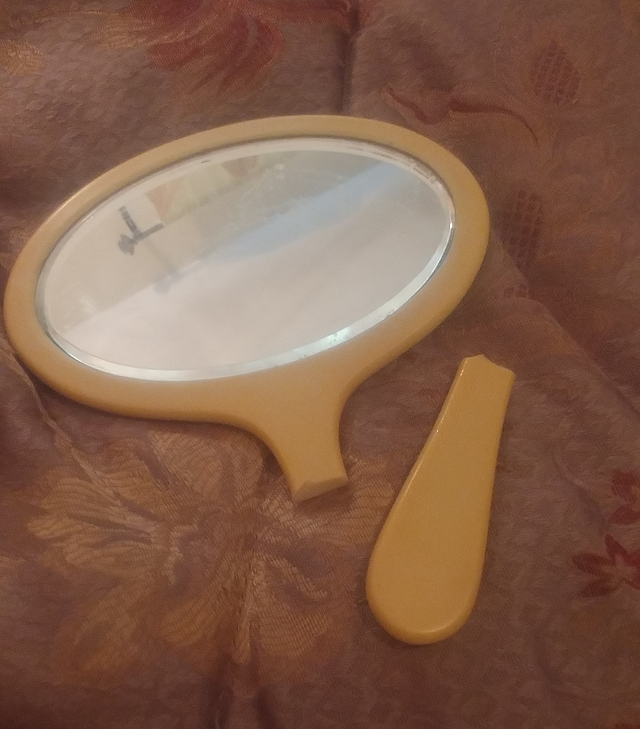
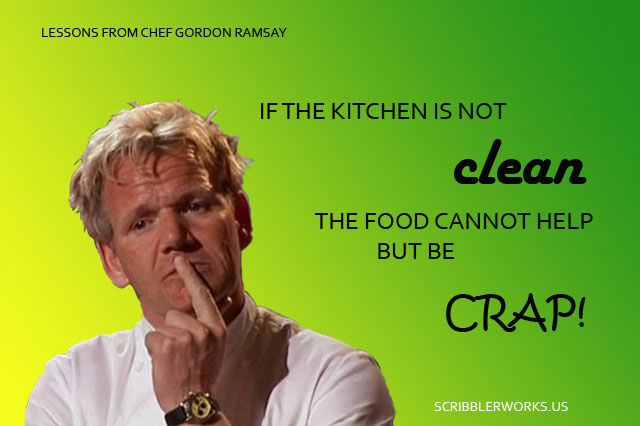 How can this apply outside of the kitchen, though? I mean, it certainly makes sense inside the kitchen, because the residue of past grime getting into the current food preparation. But what about other areas of activity?
How can this apply outside of the kitchen, though? I mean, it certainly makes sense inside the kitchen, because the residue of past grime getting into the current food preparation. But what about other areas of activity?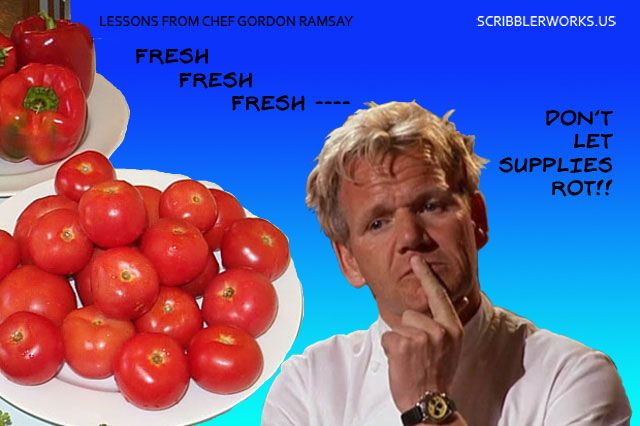 In particular on Kitchen Nightmares, Ramsay would be appalled by food that had been allowed to rot in the back corners of walk-in refrigerators. One shudders to think of the toxins that can get into food made with rotting ingredients. But again, how do you take this principle beyond the kitchen?
In particular on Kitchen Nightmares, Ramsay would be appalled by food that had been allowed to rot in the back corners of walk-in refrigerators. One shudders to think of the toxins that can get into food made with rotting ingredients. But again, how do you take this principle beyond the kitchen? In one episode of Hell’s Kitchen, the contestants were to create an “amuse-bouche” – an edible treat that is a surprising taste in one bite. And the “one bite” aspect is a crucial element. Yet one contestant came up and when describing his offering, went through a rather long list of the things he had added to that “one bite” – to the point where just when you thought he was done, he added another two or three elements to the list. It was, basically, the farthest thing from “simple.”
In one episode of Hell’s Kitchen, the contestants were to create an “amuse-bouche” – an edible treat that is a surprising taste in one bite. And the “one bite” aspect is a crucial element. Yet one contestant came up and when describing his offering, went through a rather long list of the things he had added to that “one bite” – to the point where just when you thought he was done, he added another two or three elements to the list. It was, basically, the farthest thing from “simple.”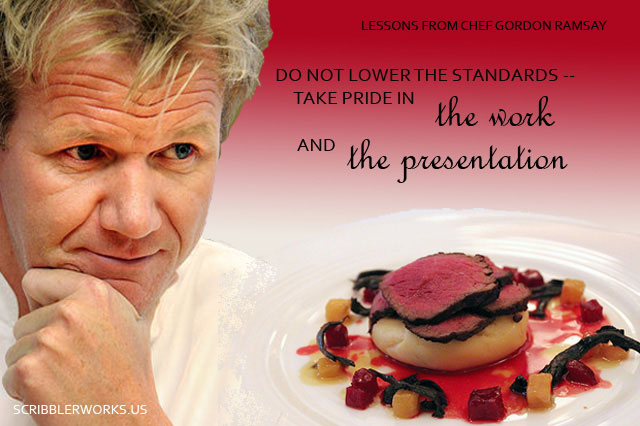 Chef Ramsay frequently reminds the chefs about, both on Hell’s Kitchen and on Kitchen Nightmares, is the importance of keeping high standards. But he takes it a step further than simply having high standards for the quality of the cooking and presentation. He urges people to take pride in their work, that if they are pleased with what they have done, they will also take care in giving it the best presentation possible. You don’t love something and then slap it down in front of someone while it looks ugly or messy.
Chef Ramsay frequently reminds the chefs about, both on Hell’s Kitchen and on Kitchen Nightmares, is the importance of keeping high standards. But he takes it a step further than simply having high standards for the quality of the cooking and presentation. He urges people to take pride in their work, that if they are pleased with what they have done, they will also take care in giving it the best presentation possible. You don’t love something and then slap it down in front of someone while it looks ugly or messy.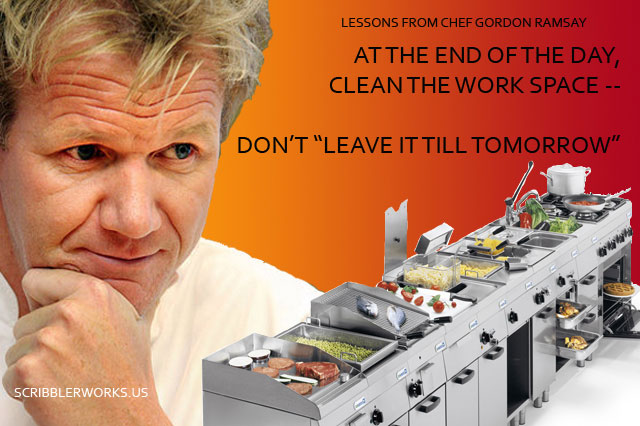 This principle circles back to the first one, about starting in a clean space so the food doesn’t come out crap. But it also addresses a pragmatic factor of human nature. If we leave a mess “until tomorrow,” the chances are that when we face it the next day, we still won’t want to tackle it. Putting off tidying up after you’d done some work, doesn’t help anyone.
This principle circles back to the first one, about starting in a clean space so the food doesn’t come out crap. But it also addresses a pragmatic factor of human nature. If we leave a mess “until tomorrow,” the chances are that when we face it the next day, we still won’t want to tackle it. Putting off tidying up after you’d done some work, doesn’t help anyone. That’s what happened recently. My friend Janet Brennan Croft posted a question on Facebook about Grail lore in the Arthurian stories. As the discussion progressed, it turned out that she was particularly interested in the questions asked of the questing knight when he encounters the Fisher King. As comments were made, I realized there wasn’t a whole lot written about that specific aspect – at least not that I could recall.
That’s what happened recently. My friend Janet Brennan Croft posted a question on Facebook about Grail lore in the Arthurian stories. As the discussion progressed, it turned out that she was particularly interested in the questions asked of the questing knight when he encounters the Fisher King. As comments were made, I realized there wasn’t a whole lot written about that specific aspect – at least not that I could recall.